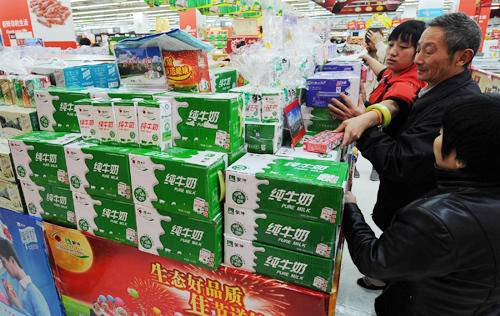 |
|
LOOMING DOUBTS: Consumers pick over dairy products in a supermarket in Chongqing (LI JIAN) |
The three companies are China's top three dairy makers, accounting for at least 70 percent of the country's milk market.
But they denied tampering in the standard-setting process.
Yili said in a statement that it had participated in the standard's drafting together with 10 other dairy companies.
"But the draft was only for reference before being submitted to authoritative experts for further discussion," it said. "It is our responsibility to help the government do some technical work."
Yili also said it will "abide by the government's industry regulations and make stricter criteria for ourselves to lead the industry on a steady and healthy course of growth."
Mengniu said it had proposed changes but did not have any say in the final decision on the standards.
Bright said the government has a set of strict procedures when applying new food standards.
Claims of innocence alone aren't enough to calm people's anger.
"You can't rule out the possibility that the enterprises hijacked the standards to avoid the costs of improving product quality," said Dong Jingshi, Secretary General of the International Food Packaging Association. "The policymakers should have made the standard-setting process more transparent and it would be more reasonable to allow consumers to have a greater say."
Song Liang, a researcher with the Distribution Productivity Promotion Center of China Commerce, said in a report that the controversies would damage the industry's public image and hurt already dwindling consumer confidence in domestic brands.
"In developed countries, there are many third-party research institutions that can help provide useful information for product testing and establishment of market rules, such as the New Zealand National Food Laboratory," he said. "China lacks these independent institutions."
The MOH has tried to dismiss the suspicions. "Members of the final review committee were all experts from universities and research institutions," said Zhang Xudong, a MOH official, at a recent press conference.
Three years after the tainted formula scandal, China's dairy industry is moving out of its shadow, though problems remain.
In the first half of 2011, Mengniu generated 790 million yuan ($124.41 million) in net profits, jumping 28.7 percent from the previous year, while the net profits of Yili skyrocketed 136.7 percent to 816 million yuan ($128.51 million). Bright also fared well, with net profits growing 20 percent to 73 million yuan ($11.5 million).
"Large companies are consolidating their market dominance thanks to buoyant demand and massive closure of smaller firms," said Zhou Siran, an analyst with the Shenzhen-based research firm CIConsulting, in a report.
The General Administration of Quality Supervision, Inspection and Quarantine, ordered in November 2010 that all dairy firms must apply for new production certificates by the end of March 2011, and those with weak quality guarantees will be shut down.
As of March 31, only 643 dairy companies, or about 55 percent of the total 1,176 firms, received licenses to continue production. Of the remaining, 426 face permanent closure while 107 were told to suspend operations until they make improvements in technologies and equipment.
Though the industry has regained much of its lost ground, product safety remains an intractable problem, added Zhou.
In August 2010, hormones were detected in some baby formula in Wuhan, capital of Hubei Province. Earlier this year, there were reports that dairy products containing leather-hydrolyzed protein, a banned additive, were also being sold.
"Another concern is that domestic businesses are facing intensifying competition as foreign brands make a rush into Chinese markets to slice a piece of the growing dairy pie, " Ma Yu, a researcher with the Chinese Academy of International Trade and Economic Cooperation, Ministry of Commerce (MOFCOM), told Economic Information Daily.
New Zealand's Natural Dairy, for instance, aims to open 3,000 retail stores across the nation this year. Japan's Meiji Dairy announced in May to invest 3 billion yen ($38.7 million) to build a plant in Suzhou, Jiangsu Province, manufacturing high-end milk and yogurt.
In another move, MOFCOM also expected China's dairy imports to hit a record high of 1.2 million tons this year, leaping from only 745,000 tons in 2010.
"Foreign formula brands, in particular, are gaining popularity among Chinese consumers, making many Chinese enterprises suffer from growing inventories and financial strains," said Ma.
A recent report of the General Administration of Customs said more than 80 percent Chinese consumers believe foreign formula brands are more reliable than domestic ones.
"To compete with foreign rivals, Chinese enterprises need to focus on improving product quality to restore the trust of consumers," said Wang Jinghai, President of Wondersun Dairy Industry Ltd. based in Harbin, Heilongjiang Province.
"Meanwhile, it is necessary for the firms to secure a stable source of raw milk supplies, and the government should also hand out more policy incentives," he added. | 